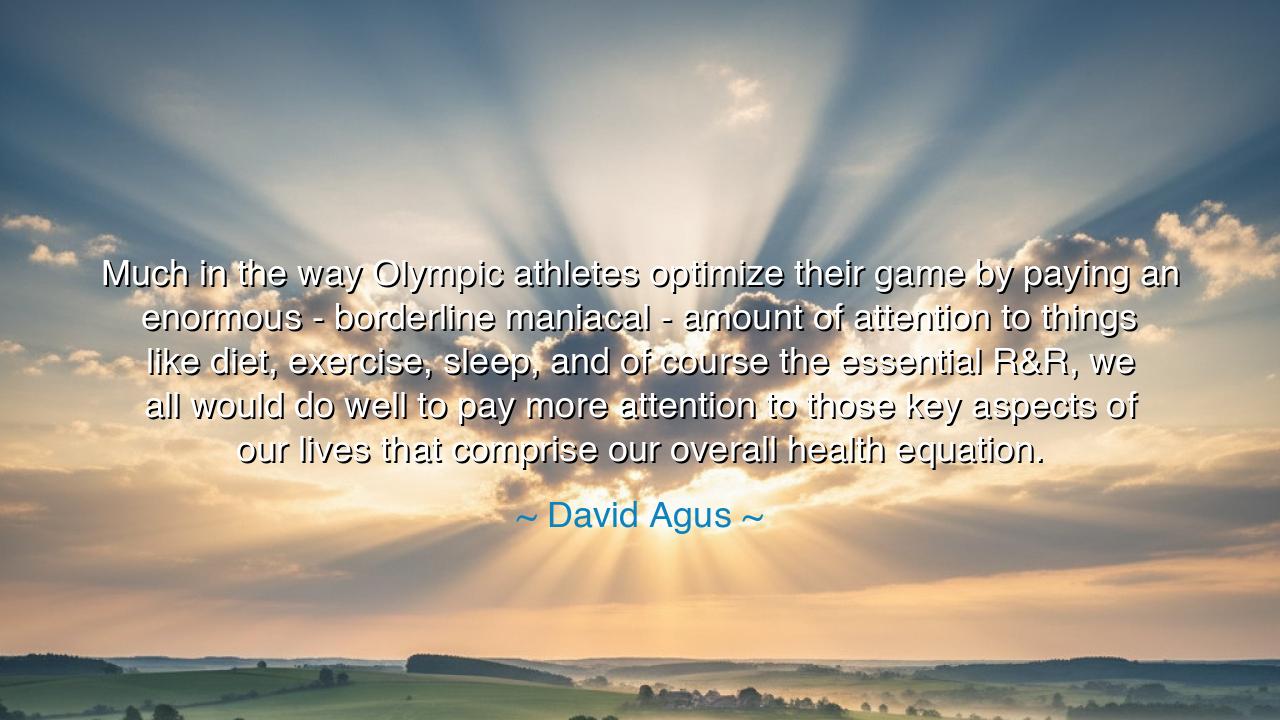
Much in the way Olympic athletes optimize their game by paying an
Much in the way Olympic athletes optimize their game by paying an enormous - borderline maniacal - amount of attention to things like diet, exercise, sleep, and of course the essential R&R, we all would do well to pay more attention to those key aspects of our lives that comprise our overall health equation.






“Much in the way Olympic athletes optimize their game by paying an enormous — borderline maniacal — amount of attention to things like diet, exercise, sleep, and of course the essential R&R, we all would do well to pay more attention to those key aspects of our lives that comprise our overall health equation.” – David Agus
In this profound reflection, David Agus, the renowned physician and visionary thinker on health and longevity, calls upon humanity to reclaim a sacred awareness — the art of intentional living. His words rise from the wisdom of science, yet they echo the timeless lessons of the ancients: that health is not chance, but discipline; not a gift bestowed by fate, but a treasure tended daily by the choices of mind and body. Agus speaks not only of the Olympian athlete, but of the Olympian spirit that resides within every human being — the spirit that seeks mastery over self, the harmony of flesh and spirit, and the calm joy of balance.
He draws his metaphor from the Olympic athlete, that symbol of human excellence. These are the men and women who dedicate their lives to precision — who study every heartbeat, every breath, every motion, that they might draw the highest potential from their mortal frame. They know that greatness is not achieved in the moment of competition, but in the countless unseen hours of discipline. Agus reminds us that we, too, are athletes of life. We run not for medals, but for vitality; we compete not against others, but against time, fatigue, and complacency. To live well, he teaches, is to live with awareness — to care for the diet, the exercise, the sleep, and the rest that form the sacred rhythm of health.
The ancients would have understood this deeply. In Greece, the philosophers spoke of arete — the pursuit of excellence in all things. They taught that the body was the vessel of the soul, and that neglecting it was a form of spiritual ignorance. The great physician Hippocrates, father of medicine, declared that food should be our medicine, and that walking was humanity’s best doctor. In the East, the sages of China and India taught the same truth through balance — the harmony of yin and yang, of effort and stillness, of wakefulness and sleep. Agus’s call to attention is thus an ancient command reborn: to live deliberately, to master the art of being well, and to remember that health is the foundation of wisdom and joy.
Consider the story of Mihály Csíkszentmihályi, the psychologist who studied “flow” — that state of complete immersion where effort and ease become one. He observed that those who mastered their craft — athletes, artists, musicians — achieved greatness through a blend of focus, rest, and rhythm. Their success was not born of endless exertion, but of deep harmony with their bodies and minds. Agus’s words mirror this truth: even the strongest must rest and recover, for without renewal, effort becomes exhaustion. Just as the warrior sharpens his blade between battles, so too must the mind and body renew their strength between days.
But Agus’s message carries another wisdom: that modern life has made us forget what the ancients knew by instinct. We rush from task to task, feeding the body with convenience and the mind with noise. We treat sleep as weakness, rest as luxury, and nutrition as afterthought. Yet the body, like the earth, cannot yield forever without care. Agus urges us to awaken — to become once again conscious stewards of our well-being. He does not ask us to be maniacal, as the athlete must be, but to be mindful — to honor the simple truths of diet, exercise, and rest that sustain our vitality.
The metaphor of the health equation is one of balance. Just as an equation requires each term to be in harmony, so too does the human being require equilibrium between body, mind, and spirit. Too much work without rest breeds decay; too much indulgence without movement dulls the spirit. The wise seek not perfection, but rhythm — the natural pulse of effort and renewal, of action and stillness. Agus calls us to treat our lives as the Olympian treats his training: with devotion, attention, and respect for the miracle that is the human body.
Therefore, children of tomorrow, take this teaching to heart: health is a discipline of awareness. Tend to your food as though it were medicine; move your body as though it were sacred; rest as though your dreams were part of your work. Be deliberate in your choices, and patient in your progress. You need not strive for medals or acclaim — only for the quiet victory of balance. For in the end, the greatest triumph is not to conquer others, but to master oneself.
And so let David Agus’s words endure as a torch to guide all who seek longevity and strength: that the path to vitality lies not in grand gestures, but in the daily devotion to the art of living well. Like the Olympian, train with care, rest with reverence, and live each day as an act of gratitude to the body that carries you and the life that sustains you. For those who honor this rhythm shall not merely exist — they shall thrive, radiant and whole, in the harmony of health and purpose.






AAdministratorAdministrator
Welcome, honored guests. Please leave a comment, we will respond soon